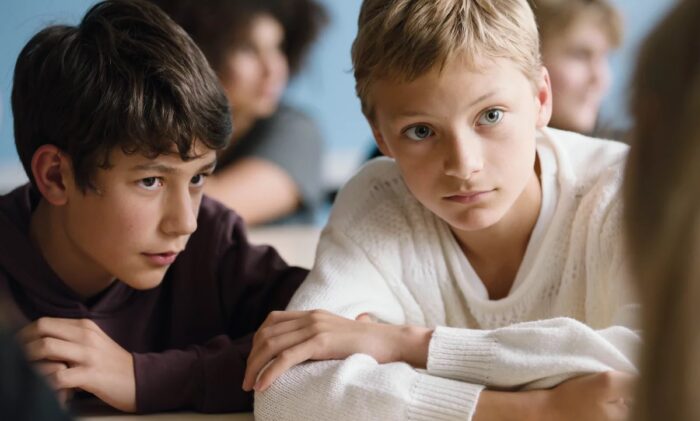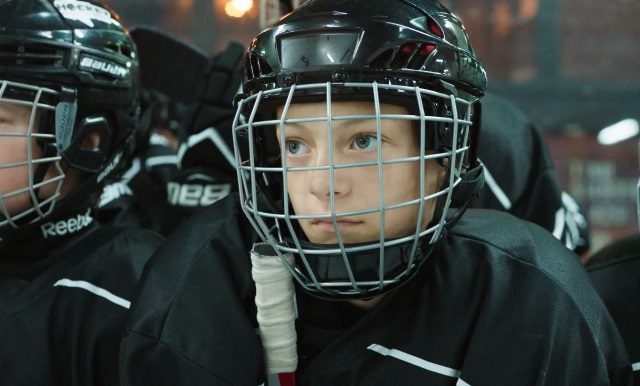Leo (Eden Dambrine) and Remi (Gustave de Waele) are close. They always have been, ever since childhood. Now embarking on their first semester at big school, the transition from childhood to adolescence will be harsh and even tragic for the pair. As children, they’ve spent every free moment together, playing all summer, sleeping at each other’s houses, in each other’s beds even. They share a casual, unthinking intimacy. On their first day, they sit beside each other in class and Remi rests his head on Leo’s shoulders. It’s the most natural thing in the world.
However, that’s about to change. Like in Laura Wandel’s superb drama Playground, what feels normal and comforting at home will get you stared at, talked about and bullied in big school. Remi loves Leo, but when Leo suffers the queries of the inquisitive girls in their class, something changes irreparably. Perhaps the girls were sincere and compassionate in their curiosity. They’re thirteen, it’s normal. But the boys certainly aren’t sympathetic in their cruel remarks and blows to the shoulder in the playground. They’re thirteen, it’s normal.

Though the quiet and sensitive Remi is unwavering, the uncomfortable atmosphere quickly takes its toll on Leo, and he starts to push his friend away. He finds new boys to hang out with, ones who like sports and girls and picking on boys like Remi. Remi is distraught by Leo’s rejection and tragedy ensues.
Lukas Dhont, the director and co-writer of Close, elicited controversy with his first feature, Girl, about a fifteen-year-old trans girl trying to negotiate a very painful coming of age. Girl had admirable intentions, but it indulged in a form of drama that came off to many as a bit…much. With Close, I’m sorry to say that this flaw has established itself as a defining factor in Dhont’s brand. It’s not just a one-time thing, it’s a legitimate Achilles heel.
It’s difficult to get into specifics without giving up the whole story (though the content description might do just that) but suffice to say, that as with Girl, there is a “big thing” in Close. It happens much earlier in Close than it did in Girl and changes the character of the narrative and the focus of the story considerably. I had feared going into Close that I knew exactly what it was going to be and I was wrong. Perhaps I wish I hadn’t been.

Is my disappointment with Close more to do with an upset to my expectations? I simply expected one story and got another. Or do I sincerely take issue with Dhont’s writing? I’m willing to admit, it might be a little of the former, but I had plenty of time to acclimate to the story the film began to tell. My immediate impression was never wholly dispelled, and that was that Close had shifted from being a film invested in exploring the emotions and motivations of its characters to one invested in wringing as many tears out of its audience members as possible.
Again, that might’ve been fine, but my cheeks remained dry and that’s just because I found something about it all unconvincing. Both Dhont’s features now have focused on adolescents, young people struggling with the burden of social pressure to conform to gender and assumed sexual roles. With Close’s Remi, as with Girl’s Lara, they didn’t choose this; it just happened to them. They’re innocent young people trying to live their lives and, being young, rash, and vulnerable, the cruelty of the world gets the better of them. When you relate to a character’s struggle, you can immediately tell when it diverges from your experience. It ceases to be your story and becomes one you don’t recognise, or at best, an uncanny facsimile of your own. That’s okay, it happens, it’s inevitable and it doesn’t necessarily mean that the story is wrong or badly told. In this case though…it just felt a bit much. Too sharp, too lacking nuance, too big and sweeping for a story with a tone this sensitive and intimate.
Dhont is an excellent director. He knows how to coach young actors to give convincing and intense performances, and his films look lovely. The real star of Close is the Belgian countryside with its stunning fields of flowers (Leo’s family are farmers) and woodlands, and Dhont’s use of colour is expert. But although the tone is realist, the story comes across like melodrama and this dissonance chased the film through from beginning to end. I wanted to become absorbed by Close, yet I could never shake an awareness of the film’s construction and desire to wring emotion out of me. The story should be deceptively simple, but it feels thin, underdeveloped and unconvincing instead. As the film goes on, the impression that the characters aren’t given enough development grows. Dhont puts a lot of the storytelling weight on young Dambrine’s shoulders, asking him to show us what he’s going through with his face and body, because the script doesn’t have the requisite heft to explore what he’s going through. Leo’s in denial about what’s happening to him, so of course he doesn’t discuss it openly, but the scenes depicting his anguish just feel pedestrian, and unworthy of the subtlety the film aspires towards.
There are certainly aspects about Close that are worthy of admiration. The performances from Dambrine and de Waele are unaffected and genuine, as are those of Peter Janssen and Emilie Dequenne, who play Remi’s father and mother, the latter of whom increasingly takes the center stage as the story unfurls. If I were to make a list of the ten or so best acting performances I’d ever seen, Dequenne would have made it twice over for her performances in Rosetta and Out Children, and Close is another reminder of what an impactful performer she can be. There are moments of genuine tenderness, especially between Leo and his older brother Charlie (Igor van Dessell) that are ten times harder hitting than the film’s contrived (or even exploitative) attempts at tragedy.
Though it feels closer to home than his debut, Close still exhibits the same fundamental fault as Girl: its story feels like it was contrived to create drama rather than tell an organic truth about the people at the center of its story who remain vaguely defined archetypes. At least, that’s how it came across to me. I know many have found this film extremely affecting (it won the Grand Prix at Cannes and is nominated for the best international feature Oscar) and I’m honestly surprised I don’t. Had it sold me on its story, I’m sure it’d have left me in bits. Sadly, though, I just wasn’t buying it.




